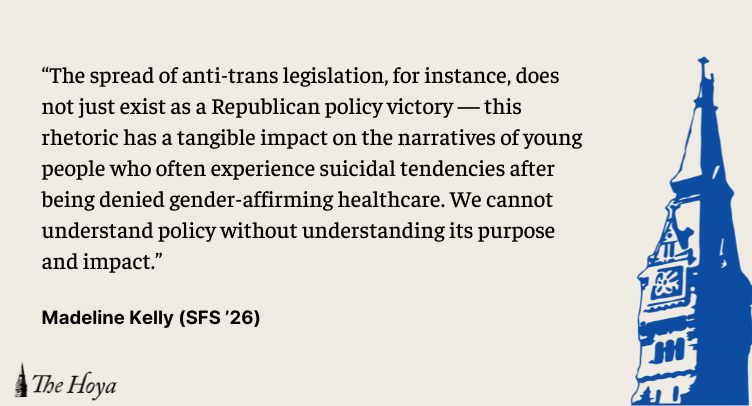In the wake of anti-trans legislation across the nation, Georgetown University hosted its first-ever trans and nonbinary panel Sept. 26 in Gaston Hall. The event featured Montana State Representative Zooey Zephyr, journalist Erin Reed, trans rights activist Charlotte Clymer and Oklahoma State Representative Mauree Turner.
As a Montana native myself, Representative Zephyr’s activism in a predominantly red state has been nothing short of inspiring.
In an interview prior to the panel, Representative Zephyr shared her experience in the Montana legislature with me, discussing how she maintains hope in the face of such obstacles and how activists can communicate effectively in an increasingly divided political climate.
At Georgetown, we must adopt Representative Zephyr’s message of cooperation, while sticking true to our values as we work to platform a diverse range of speakers that do not amplify intolerance and ignorance.
Zephyr studied business administration and creative writing at the University of Washington as an undergraduate and then went to the University of Montana to study creative writing and literary criticism for her master’s degree. Due to her unique background in literature, Zephyr is acutely aware of the power of narrative in politics.
Information does not exist in a vacuum; it is accompanied by complex, personal stories that often have a real-life impact.
The spread of anti-trans legislation, for instance, does not just exist as a Republican policy victory — this rhetoric has a tangible impact on the narratives of young people who often experience suicidal tendencies after being denied gender-affirming health care. We cannot understand policy without understanding its purpose and impact.
Zephyr’s narrative-based approach has greatly influenced her interactions with her colleagues.
During the 2023 Montana legislative session, Montana Republicans banned Representative Zephyr from the house floor and from participating in debates after she voiced opposition to Senate Bill 99. The proposition sought to prohibit transgender medical care for minors.
During debates on the bill, Zephyr said that Montana Republicans would have “blood on their hands” if they were to keep lifesaving medical and surgical care from trans youth.
Zephyr did not back down and was not allowed to participate for the remainder of the term, prohibiting her from advocating for her community. We must seek to emulate this passion as we voice our support for the transgender community.
Zephyr’s censure displayed her personal connection to her constituents. Supporters immediately came to show their disdain for the ruling by chanting “let her speak” outside the legislature. Her persistence was respected and admired by Montana residents like myself.
As a transgender woman and activist, Zephyr is no stranger to difficult situations, discussions and people. Zephyr does not believe that her goal of cooperation is mutually exclusive with these barriers. In fact, her strength in morality, belief and opinion has garnered greater respect among both her supporters and opponents.
In the face of extreme political division, it often appears that holding fast to one’s beliefs is counterproductive to cooperation, but Zephyr assured me that this is not the case.
The legislators who perpetuate harm to the transgender community do not exist without a narrative themselves.
Montana is a rural state with relatively low diversity, so many residents have had little, if any, interaction with trans people. This can contribute to the development of transphobia. It is important to actively engage with people without much familiarity with the LGBTQ+ community to avoid this uninformed prejudice.
Zephyr herself embodies this message by speaking earnestly and cooperating with Republicans, even those who have opposed her in the past.
For example, Zephyr worked with her Republican colleagues to pass House Bill 218, which increased oversight of outdoor and alternative adolescent programs which are notorious for abuse. Seeing an opportunity to advocate for Montana youth, she led the charge.
Despite valuing cooperation, Zephyr emphasized that cooperating with others of opposing beliefs does not entail total forgiveness. She looks for fruitful conversation and mutually beneficial policy, but refuses to absolve colleagues of cruelty or hateful rhetoric.
When the policy, value or conversation itself is harmful, it is important not to dismiss this rhetoric entirely, but to recognize its narrative.
This means stating the impact of the anti-trans legislation, even if the language makes other lawmakers uncomfortable. This means refusing to apologize, even when Republicans agreed she could resume participation in the 2023 session.
In addition to examining the language of anti-trans legislation, we must also examine why these policies gain traction. When lawmakers try to advance this harmful legislation, they are likely acting out of ignorance — not solely hatred — which can be combated with open discourse.
At Georgetown, we must follow Zephyr’s example.
Georgetown has a history of platforming harmful people. Most notably, the university hosted former Vice President Mike Pence, who has advocated for bans on gender-affirming health care for minors, twice in the past year. The university also hosted Riley Gaines, a proponent of the exclusion of trans women in sports, in Nov. 2022. Both have directly harmed the trans community with their words and actions.
Speakers of this sort aim to marginalize the LGBTQ+ community, which naturally makes the on-campus community uncomfortable.
As Zephyr does on the Montana house floor, we must listen to and find the narrative in these speakers’ words and ideas at Georgetown, while also continuing to dissect their damaging viewpoints.
Madeline Kelly is a sophomore in the School of Foreign Service.














